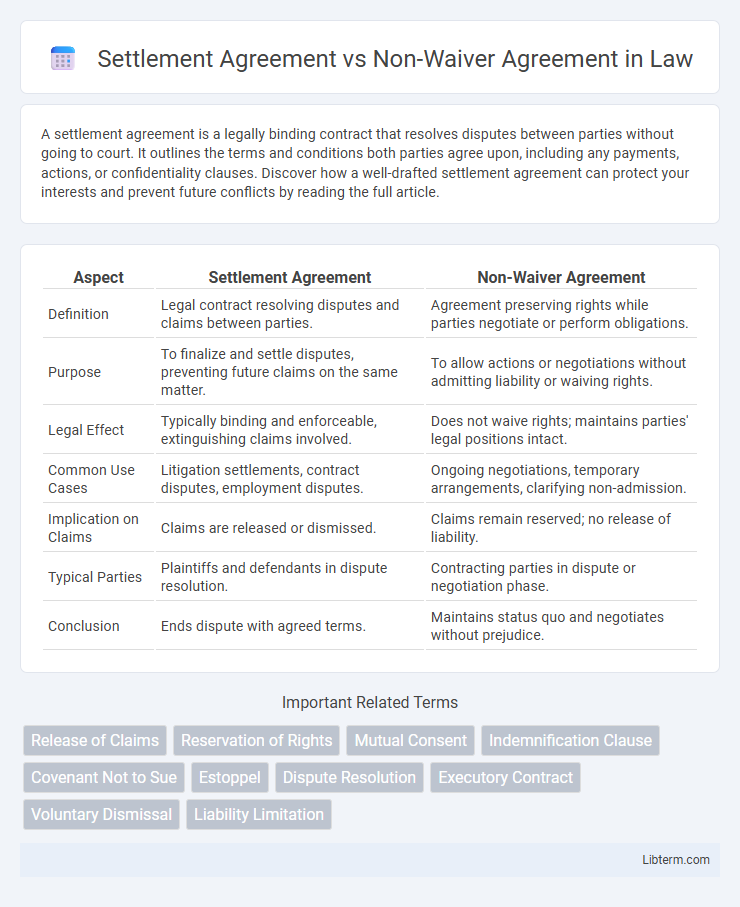A settlement agreement is a legally binding contract that resolves disputes between parties without going to court. It outlines the terms and conditions both parties agree upon, including any payments, actions, or confidentiality clauses. Discover how a well-drafted settlement agreement can protect your interests and prevent future conflicts by reading the full article.
Table of Comparison
| Aspect | Settlement Agreement | Non-Waiver Agreement |
|---|---|---|
| Definition | Legal contract resolving disputes and claims between parties. | Agreement preserving rights while parties negotiate or perform obligations. |
| Purpose | To finalize and settle disputes, preventing future claims on the same matter. | To allow actions or negotiations without admitting liability or waiving rights. |
| Legal Effect | Typically binding and enforceable, extinguishing claims involved. | Does not waive rights; maintains parties' legal positions intact. |
| Common Use Cases | Litigation settlements, contract disputes, employment disputes. | Ongoing negotiations, temporary arrangements, clarifying non-admission. |
| Implication on Claims | Claims are released or dismissed. | Claims remain reserved; no release of liability. |
| Typical Parties | Plaintiffs and defendants in dispute resolution. | Contracting parties in dispute or negotiation phase. |
| Conclusion | Ends dispute with agreed terms. | Maintains status quo and negotiates without prejudice. |
Settlement Agreement vs Non-Waiver Agreement: Key Differences
Settlement Agreement resolves disputes by outlining mutual obligations and terms for finalizing claims, legally binding parties to agreed conditions. Non-Waiver Agreement preserves parties' rights by preventing any actions or communications from being interpreted as waiving legal claims or defenses without resolving the underlying dispute. Key differences include their purpose--Settlement Agreement ends litigation with enforceable terms, while Non-Waiver Agreement maintains status quo without conceding rights or responsibilities.
Understanding Settlement Agreements
Settlement agreements legally resolve disputes by outlining mutually agreed terms, often including compensation and specific obligations, to avoid further litigation. These contracts provide clarity, finality, and enforceability, protecting parties from future claims related to the settled issue. Understanding settlement agreements ensures parties recognize the binding nature, the waiver of rights to pursue claims, and the importance of explicit terms for dispute resolution.
What Is a Non-Waiver Agreement?
A Non-Waiver Agreement is a legal contract designed to prevent parties from unintentionally waiving their rights or claims by taking certain actions or engaging in negotiations. It explicitly clarifies that participation in discussions or partial performance does not constitute a surrender of any legal rights, preserving the parties' ability to enforce their claims later. This agreement is critical in dispute resolution contexts where parties want to explore settlement options without compromising their legal positions.
Legal Purpose of Settlement Agreements
Settlement agreements legally resolve disputes by outlining mutually agreed terms to avoid further litigation, ensuring enforceability and finality. They provide clear, binding obligations that prevent future claims related to the settled matter. Non-waiver agreements, in contrast, preserve parties' rights without conceding liability or resolving underlying disputes.
When to Use a Non-Waiver Agreement
A Non-Waiver Agreement is essential when parties want to preserve their rights while engaging in negotiations or discussions without conceding any claims or defenses. It is commonly used in situations where ongoing disputes require temporary cooperation or information exchange but no party wishes to forfeit legal rights or claims. Employing a Non-Waiver Agreement prevents inadvertent waiver of contractual or legal rights prior to a final settlement or resolution.
Pros and Cons of Settlement Agreements
Settlement agreements provide a legally binding resolution to disputes, offering certainty and potentially saving costs associated with prolonged litigation. They allow parties to define mutually agreeable terms, reduce court intervention, and maintain confidentiality, but may require compromise that leaves some claims unresolved. Conversely, settlement agreements can limit future legal actions, may be challenging to negotiate fairly, and could result in insufficient remedies if terms are not thoroughly vetted.
Benefits and Risks of Non-Waiver Agreements
Non-Waiver Agreements allow parties to negotiate or share information without relinquishing their legal rights, preserving claims for future enforcement or litigation. These agreements benefit businesses by facilitating open dialogue during disputes without implying admission of liability, reducing the risk of unintended waiver of rights. However, the risk lies in possible misunderstandings about the agreement's scope, which can lead to disputes if one party assumes concessions or rights have been waived when they legally have not.
Common Clauses in Settlement Agreements
Settlement agreements commonly include confidentiality clauses, release of claims, payment terms, and dispute resolution mechanisms to finalize disputes efficiently and avoid future litigation. These agreements often contain non-admission of liability clauses, ensuring that neither party concedes fault while resolving the issue. In contrast, non-waiver agreements primarily aim to preserve rights during negotiations and typically lack the comprehensive mutual releases and payment obligations found in settlement agreements.
Typical Provisions in Non-Waiver Agreements
Typical provisions in Non-Waiver Agreements include explicit language stating that the agreement does not constitute a waiver of any rights or claims by either party, ensuring that no admissions of fault or liability are implied. These agreements often specify the scope and duration of the non-waiver, detailing which rights are preserved and under what circumstances the agreement applies. Confidentiality clauses, dispute resolution mechanisms, and conditions under which the agreement may be terminated or modified are also common to protect the interests of all parties involved.
Choosing Between Settlement and Non-Waiver Agreements
Choosing between a Settlement Agreement and a Non-Waiver Agreement hinges on the desired legal outcome: Settlement Agreements legally resolve disputes by outlining terms agreeable to all parties, often including compensation or specific actions, thereby preventing future claims on the same issue. Non-Waiver Agreements, in contrast, allow parties to temporarily forgo certain rights or claims without relinquishing them permanently, preserving the option to revisit disputes or negotiations later. Businesses often prefer Settlement Agreements for finality and certainty, while Non-Waiver Agreements are strategic for maintaining flexibility during ongoing negotiations or investigations.
Settlement Agreement Infographic

 libterm.com
libterm.com